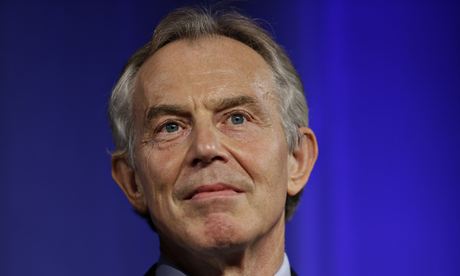Patrick Wintour, political editor The Guardian, Wednesday 23 April 2014
Former PM, who supported Egyptian military's overthrow of democratically elected government, to urge west to take sides
Tony Blair will say: 'The threat of radical Islam … is destabilising communities and even nations.' Photograph: Matt Rourke/AP
Tony Blair will warn the west it needs to take sides in the Middle East and move the battle against Islamist extremism to the top of the political agenda.
In a speech to Bloomberg in London on Wednesday, the former Labour prime minister will say: "The important point for western opinion is that this is a struggle with two sides. So when we look at the Middle East and beyond it to Pakistan or Iran and elsewhere, it isn't just a vast unfathomable mess with no end in sight and no one worthy of our support. It is in fact a struggle in which our own strategic interests are intimately involved; where there are indeed people we should support and who, ironically, are probably in the majority if only that majority were mobilised, organised and helped.
"But what is absolutely necessary is that we first liberate ourselves from our own attitude. We have to take sides. We have to stop treating each country on the basis of whatever seems to make for the easiest life for us at any one time. We have to have an approach to the region that is coherent and sees it as a whole. And above all, we have to commit. We have to engage".
He will accept engagement comes at a cost, admitting there is no commitment that doesn't mean taking a risk.
His aides said the keynote speech was not a call for revolution across the region, but to recognise that the west cannot stand aside from struggles such as the one in Syria.
Blair caused controversy when he sided with the Egyptian military's overthrow of the democratically elected government of the Muslim Brotherhood, and his intervention in Iraq in 2003 has been cited as one reason why the west has refused to intervene more in the three-year Syrian war.
Blair will warn: "The threat of this radical Islam is not abating. It is growing. It is spreading across the world. It is destabilising communities and even nations. It is undermining the possibility of peaceful co-existence in an era of globalisation. And in the face of this threat we seem curiously reluctant to acknowledge it and powerless to counter it effectively".
In a clear reference to Saudi Arabia, he will say: "It is absurd to spend billions of dollars on security arrangements and on defence to protect ourselves against the consequences of an ideology that is being advocated in the formal and informal school systems and in civic institutions of the very countries with whom we have intimate security and defence relationships."
He claims some of these countries want to break out of this ideology, but need the west to make it a core part of the international dialogue in order to force the necessary change within their own societies.
Blair will be unrepentant about his apparent rejection of democracy in Egypt, saying the "Muslim Brotherhood government was not simply a bad government. It was systematically taking over the traditions and institutions of the country."
He will claim the revolt of 30 June 2013 led by the army was "not an ordinary protest. It was the absolutely necessary rescue of a nation. We should support the new government and help."
He will add that this does not mean strong criticism of the death sentence on 500 Egyptians, but does require showing "some sensitivity to the fact that over 400 police officers have suffered violent deaths and several hundred soldiers been killed".
Across the Middle East, he will say, there is one essential struggle between pluralistic societies and open economies, where the attitudes and patterns of globalisation are embraced; and those who want to impose an ideology born out of a belief that there is one proper religion and one proper view of it, and that this view should exclusively determine the nature of society and the political economy.
Tony Blair to say battle against Islamic extremism is paramount | Politics | The Guardian




